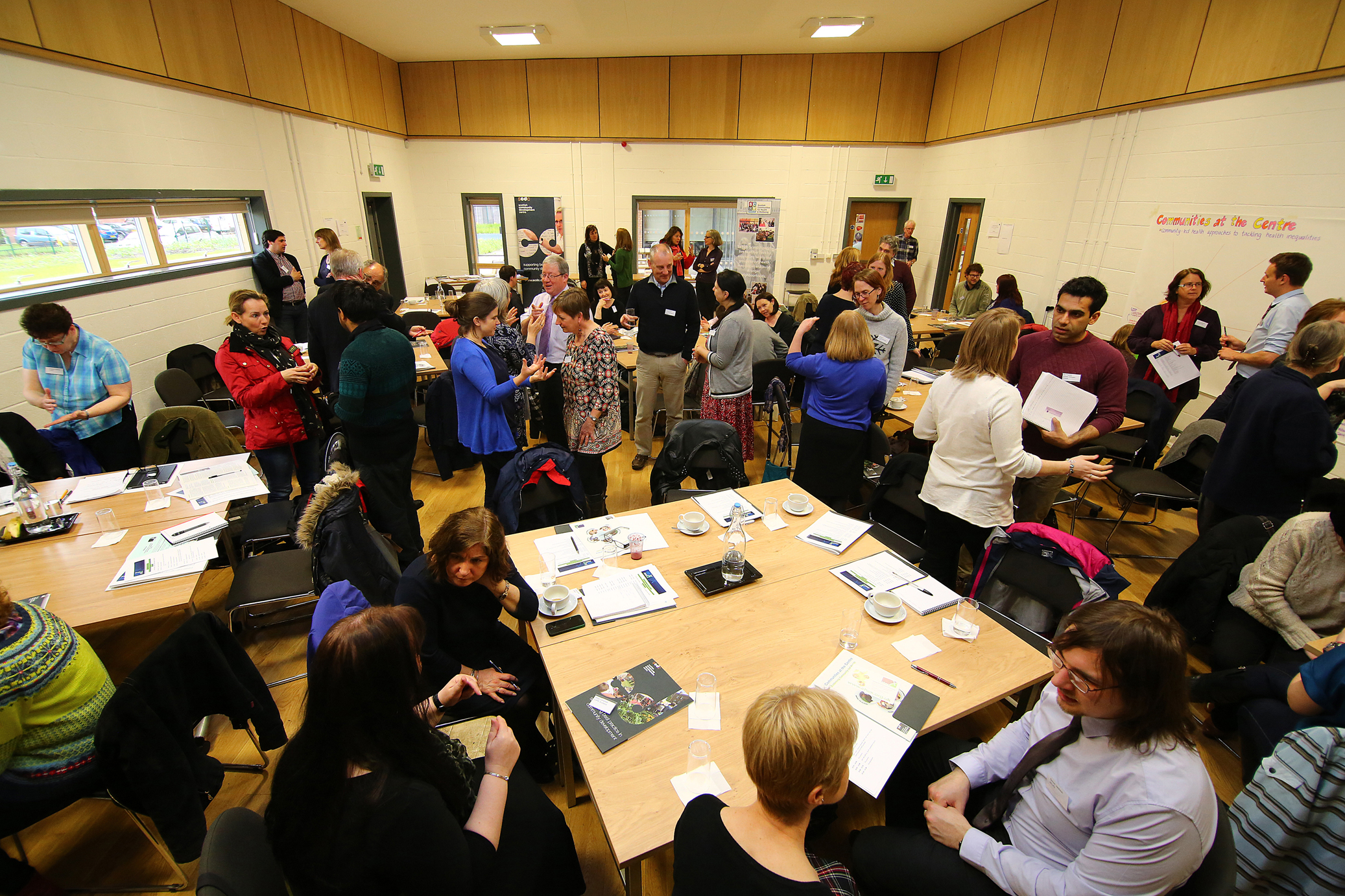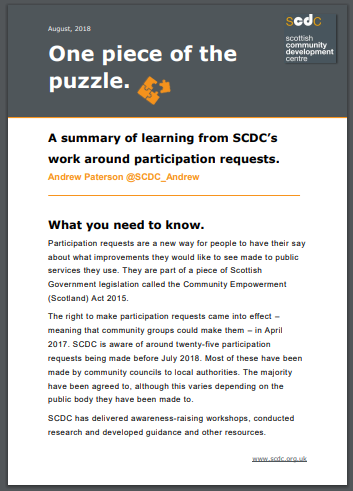The Community Empowerment Act
/Training: Learn about the Act, explore the opportunities and challenges it presents and find out about the processes for participation requests and community planning.
Read MoreWe work directly with community organisations, people who work in communities and with people who make policy.
What we do
We deliver large scale programmes across Scotland to help build the capacity of the community sector, support public agencies to work effectively with communities and to widen participation in local democracy.
We support and manage a series of networks, using our learning from these and working with communities and community practitioners to inform policy and legislation.
A major part of our work is providing research, training and consultancy services. All of our services are tailored to meet the individual needs of the organisations and partnerships we support. Find out more about our training.
We work closely with the European Community Development Network and the International Association of Community Development.

Our key work
CHEX supports and promotes community development approaches to improving people's health.
PB Scotland acts as a hub for sharing and learning about the work being done by participatory budgeting initiatives around Scotland.
The Scottish Co-production Network is a way for people to share ideas and learning about co-production.
Health Issues in the Community (HIIC) is a training programme which looks at issues such as health, poverty, power and social justice in a different way.
Supporting Communities is a package of support for community organisations across Scotland to help build skills, confidence and capacity.
VOiCE is planning and recording software that assists individuals, organisations and partnerships to design and deliver effective community engagement.
Knowledge is Power is a programme to support community-led action research across Scotland.
The LEAP framework is designed to support a partnership approach to achieving change and improvement in the quality of community life.
The Communities Channel Scotland is a website which puts communities in the spotlight by connecting people and sharing ideas.
This resource is designed to build the skills, confidence and knowledge of refugee-led organisations and refugee supporting organisations, although most of the materials will be useful to any community group.
Participation requests are one way that communities can ask to work with public bodies to make services better. SCDC works to raise awareness, and support the use, of participation requests, as well as to help strengthen and improve how they work.
This programme aims to explore what resilience looks like in our communities, how we can build on existing good practice and improve how communities and local agencies can work together to develop strong, resilient communities.
Our statement promoting community involvement in climate decision-making on as COP26 summit begins in Glasgow.
These pages provide advice on how to virus proof the fantastic things communities are doing and reduce the risk of indirect spread of Covid-19.
The National Standards for Community Engagement are a way to build and sustain the relationships between public services and community groups.
A report from Barnardo's Scotland & SCDC about peer-led evaluation and the impact that the Barnardo’s Nurture Service has had on the people involved.
Using action research, we wanted to find out more about the implications of Local Place Plans were for the planning system and communities.
Exploring how community councils can contribute to democratic renewal in Scotland.
The Community Empowerment (Scotland) Act strengthens community voices in decisions about public services and makes it easier for them to own and manage land and buildings.
Our resources
SCDC submitted a written response to the Scottish Government’s consultation on proposals for a new qualifications body and a new approach to inspection of Education in Scotland.
SCDC submitted a written response to the Scottish Government’s consultation on a proposed Human Rights Bill for Scotland. We’ve summarised our key points, with a focus on the importance of participation and community capacity building within the context of human rights.
Here are the key points from SCDC’s response to the Scottish Government’s consultation on ‘Effective community engagement in local development planning’ guidance in September 2023.
Community wealth building is focused on growing the influence communities have on the economy and ensuring communities receive more of the benefits from the wealth they help to generate. The Scottish Government has adopted a community wealth building approach, and sees it as a key tool in supporting a just transition to net zero and reducing child poverty. This is a summary of SCDC’s response to the Scottish Government’s consultation on community wealth building which ran in 2023.
If you lived in a 20-minute neighbourhood you would be able meet all your day-to-day needs without having to travel more than 20 minutes by foot, bike or public transport. We’ve summarised the key points from our response to the Scottish Government’s consultation on planning guidance it is developing in relation to 20-minute neighbourhoods and local living.
SCDC’s participation request resource pack contains a range of guides, tools and templates to help you understand the Participation Request process, the language and terms that are used, and the process involved.
We’ve made these graphics to help show the 7 standards in a simple way and highlight the key elements.
Are you planning a community event and want to do your bit to make a climate impact? Even if your event isn’t focused on climate change, there’s still lots you can do. Here are some practical things to make your event greener, and some things to think about too.
The National Standards for Community Engagement are a way to build and sustain the relationships between public services and community groups.
A report from Barnardo's Scotland & SCDC about peer-led evaluation and the impact that the Barnardo’s Nurture Service has had on the people involved.
Exploring how community councils can contribute to democratic renewal in Scotland.
This report aimed to develop learning, take actions, improve practice and reflect together on opportunities and challenges in the current context.
Our response to the recent Scottish Government’s Democracy Matters consultation welcomes the idea of people having more control over what happens in their communities.
SCDC and the Poverty Alliance worked with ten community organisations to co-design a resource framework which could be used to support communities across Scotland to conduct their own inquiries into the issues affecting them.
Exploring the local experiences of refugee resettlement and how examines how community development approaches could be used to further refugee integration in Scotland.
ARC is to help community and voluntary groups carry out research in and with their communities.
This paper outlines the common approaches that community development and co-production take.
Published in 2015, 'Co-production – how we make a difference together' is a suite of resources – videos, case studies and information to help spread understanding of co-production
Building Stronger Communities is a practical assessment and planning tool for community capacity building in Scotland.
The Community Empowerment (Scotland) Act strengthens community voices in decisions about public services and makes it easier for them to own and manage land and buildings.
Training: Learn about the Act, explore the opportunities and challenges it presents and find out about the processes for participation requests and community planning.
Read MoreFind out what the participation request are, what they do and how communities can get involved.
Read MoreIf improving public services is the puzzle, how important a 'piece' are participation requests?
Read MoreExplore our other programmes
Privacy policy | Terms of use
© SCDC
SCDC is a company limited by guarantee registered in Scotland (361532) and a Scottish charity (SC040614).
